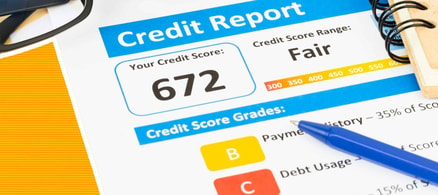Where does your score come from?

You might assume that, since you’re a total unknown, your starting score will be zero. But in fact, prior to having a credit history, you have no score at all.
Your starting score will only be calculated once you’ve had credit, such as a credit card or a loan, in your name for at least six months.
The three big credit-reporting bureaus — Equifax, Experian and TransUnion — have access to slightly different information about you and use that information to score you in slightly different ways.
However, the scoring model they use most often comes from FICO. These scores range from 300 to 850; the higher your score, the more trustworthy you appear to lenders.
Kiss Your Credit Card Debt Goodbye
Having a single loan to pay off makes it easier to manage your payments, and you can often get a better interest rate than what you might be paying on credit cards and car loans.
Fiona is an online marketplace offering personalized loan options based on your unique financial situation.
When you consolidate your debt with a personal loan, you can roll your payments into one monthly installment. Find a lower interest rate and pay down your debt faster today.
Get StartedWhat is your starting credit score?
The first score you get won’t be at the bottom of the scale, but it won’t be at the top either. More often than not, starting credit scores fall within the “fair” range of 580 to 669.
You haven’t had time to trash your score with missed payments, but you also haven’t had much time to build up a record of smart, reliable borrowing.
Generally speaking, your starting score will be too low to qualify for the best interest rates available. However, you can take some simple steps to get your score into good or possibly excellent shape within a year or two.
Understand what goes into your score
Five factors contribute to your FICO score, though some carry more weight than others:
1. Payment history (35%)
This is the single most important factor, making up over a third of your score. It shows lenders whether you have a history of late or missed payments on loans, credit cards and sometimes other bills.
While you’re building your credit score, it’s essential that you make all of your payments on time.
Even one late payment can cause your score to drop. And if you fail to make up for a missed payment within 30 days, your account could be labelled “delinquent,” a stain that will stay in your credit history for up to nine years.
2. Credit utilization ratio (30%)
Your utilization ratio is the amount of credit you’re currently using divided by the total amount of credit you have available to you, expressed as a percentage.
Ideally, you want to keep your utilization ratio below 30%. So if you’ve only got one credit card and it has a $1,500 limit, you should aim to have less than $500 in debt on it at any given time.
If possible, try to pay off all your balances in full each month. That way, your credit utilization will be 0%.
3. Credit length (15%)
The amount of time you’ve had credit also plays a role. If you’re a new user, the length of your credit history will be quite short, and there isn’t much you can do about it but wait.
Once you’re a bit further along, make an effort not to cancel old credit cards (especially cards with no annual fee) even if you don’t use them very often. All active cards count toward your credit length.
If you do need to close a credit account, start with the one you opened most recently and keep your oldest accounts active and paid off.
4. Credit mix (10%)
Your credit mix is the number of different types of credit that you have on your report.
Using a variety of products — credit cards, student loans, auto loans, mortgages, lines of credit — shows lenders that you’re a safe borrower in any scenario.
It’s worth noting that lenders don’t always report every account to every credit bureau, so opening a new account might not have an impact on your mix. So if you’re looking to boost your score, make sure to check with the lender first to make sure your new account will be reported.
5. Hard inquiries (10%)
Whenever you apply for a loan or a new credit card, the lender will pull your credit history before deciding whether to approve your application.
This is known as a “hard inquiry,” and it can decrease your score by several points.
Although this drop in your score is only temporary, it’s a good idea to avoid stacking up multiple hard inquiries in a short amount of time. That makes it look like you’re desperate for money.
After undergoing a hard inquiry, keep an eye on your score and try not to apply for any new credit cards or loans until you see it go back to normal.
Stop overpaying for home insurance
Home insurance is an essential expense – one that can often be pricey. You can lower your monthly recurring expenses by finding a more economical alternative for home insurance.
SmartFinancial can help you do just that. SmartFinancial’s online marketplace of vetted home insurance providers allows you to quickly shop around for rates from the country’s top insurance companies, and ensure you’re paying the lowest price possible for your home insurance.
Explore better ratesMonitor your credit score on a regular basis
Once you understand what goes into your credit score, get into the habit of checking it every month. You can find a number of services online that will let you monitor your score for free.
Many of these free credit-monitoring services, like Credit Sesame, also provide personalized feedback and tips to help you improve your score.
By keeping track of your credit score, you’ll be able to see whether your efforts are working — and you’ll be able to take action if it suddenly drops. That will increase your chances of getting approved for a better rate on a credit card or loan down the road.
Open a secured credit card
If your score isn’t good enough to get a decent credit card and start building your score, try opening a secured credit card instead. Companies are happy to hand them out because they carry such little risk.
These cards require you to put down a deposit upfront — usually one or two times your desired credit limit. If you default on your debts, you’ll forfeit your deposit.
As long as you use your card regularly and pay off your balance in full and on time, your payment history will improve.
After a few months you can ask your issuer for a higher credit limit, which will help to bring down your utilization ratio. You might also get the option to upgrade to a non-secured card.
Get a credit builder loan
Sometimes known as a “fresh start loan,” these loans don’t require you to have a good credit score and are specifically used to boost your credit rating.
Unlike a normal loan, the amount that you “borrow” won’t go into your pocket. Instead, the total will be held in a bank account while you make your monthly payments. You’ll only get access to the money when your loan is fully paid off.
Normally that would sound like a pretty bad deal, but credit builder loans help to boost your payment history and credit mix.
Once you’ve paid it off, your credit score should go up, and you can dump the money back into a high-yield savings account or invest it for your future.
Take your borrowing to the next level
After you’ve spent some time working on your score and bumped it up into the “good” credit range (660 to 724), you’ll qualify for much better interest rates.
But don’t stop building your credit just because your score is decent. Take advantage of the perks you’ve worked so hard for and use them to improve your credit rating even more.
Consider taking out a low-interest auto loan or personal loan to help diversify your credit mix and improve your payment history.
Check whether you’re eligible for a higher limit on your credit card to bring down your credit utilization ratio. You might also be able to open a new credit card with a lower interest rate.
Soon enough you’ll have a strong enough score to start thinking about getting a mortgage and buying a place to call home.
Just remember not to go overboard and borrow more than you can safely pay back. Keep making all of your monthly payments in full and keep checking your credit score at least once a month.
Sponsored
Follow These Steps if you Want to Retire Early
Secure your financial future with a tailored plan to maximize investments, navigate taxes, and retire comfortably.
Zoe Financial is an online platform that can match you with a network of vetted fiduciary advisors who are evaluated based on their credentials, education, experience, and pricing. The best part? - there is no fee to find an advisor.








